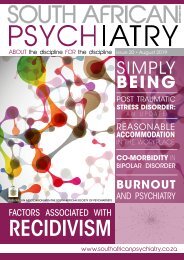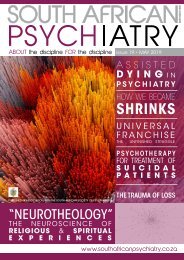South African Psychiatry - February 2019
South African Psychiatry - February 2019
South African Psychiatry - February 2019
Create successful ePaper yourself
Turn your PDF publications into a flip-book with our unique Google optimized e-Paper software.
FEATURE<br />
unseen corner of the mind. The baby attempts to live<br />
in a state of bliss and preside over an omnipotent<br />
objectless ‘imaginary heaven’ but, in truth, has<br />
constructed a paranoid Kafka-like dominion though<br />
introjection and projection with the return of the<br />
projected and dislocation by objects in reality<br />
imminent.<br />
OF COURSE, IT IS JUST A MATTER OF TIME<br />
BEFORE THE BLOW OF THE FALL FROM<br />
GRACE INTO THE DISILLUSIONMENT<br />
OF ACTUAL REALITY OCCURS. FAILING<br />
THIS, THE BABY WILL BE ILL-EQUIPPED TO<br />
ADAPT TO THE ORDINARY WORLD FROM<br />
WHICH HE IS, AFTER ALL, NOT EXEMPT. AS<br />
ESSENTIAL AS IT IS FOR THE INFANT TO<br />
INITIALLY JUDGE FOR HIMSELF WHETHER<br />
AN OBJECT OF SATISFACTION POSSESSES<br />
THE GOOD, DESIRABLE ATTRIBUTE AND SO<br />
DESERVES TO BE TAKEN INTO HIS EGO, IT<br />
IS EQUALLY IMPORTANT FOR THE INFANT<br />
TO REGISTER THAT THE OBJECT IS ‘OUTSIDE<br />
OVER THERE’ SO THAT IT CAN BE SOUGHT<br />
OUT WHENEVER IT IS NEEDED (FREUD,<br />
1925). THE PLEASURE EGO CAN DO<br />
NOTHING BUT WISH, WORK FOR A YIELD<br />
OF PLEASURE AND AVOID UNPLEASURE<br />
(FREUD, 1911). THE BABY HAS TO<br />
LEARN TO USE HIS APPETITES, IMPULSES,<br />
DESIRES, WISHES, NEEDS AND FEELINGS<br />
TO LATCH, TO WORK, TO RETRIEVE THE<br />
GOOD THAT IS ACTUALLY IN A WORLD<br />
BEYOND OMNIPOTENT CONTROL. THIS<br />
ORGANISES THE EGO AND ALLOWS LINKS<br />
TO BE ESTABLISHED SO THAT THE OBJECTS<br />
OF THE PSYCHE - REPRESENTATIONS -<br />
CAN BE PRODUCED AND THE EXTERNAL<br />
OBJECT CAN BE DISTINGUISHED FROM<br />
THE PHENOMENOLOGICAL JUDGEMENT<br />
OF IT. THE REALITY EGO CAN THEN<br />
STRIVE FOR WHAT IS USEFUL WHILE<br />
SAFEGUARDING THE EXPERIENCE OF<br />
PLEASURE (FREUD, 1911).<br />
How does this first developmental achievement<br />
occur? “The baby,” writes Donald Winnicott (1945)<br />
“has instinctual urges and predatory ideas. The<br />
mother has a breast and the power to produce milk,<br />
and the idea that she would like to be attacked by<br />
a hungry baby. These two phenomena do not come<br />
into relation with each other till the mother and child<br />
live an experience with each other…I think of the<br />
process as if two lines came from opposite directions,<br />
liable to come near each other. If they overlap there<br />
is a moment of illusion – a bit of experience which the<br />
infant can take as either his hallucination or a thing<br />
belonging to external reality” (p. 152). This requires<br />
a particular type of environment: a caregiver who is<br />
able to reduce the impingements of internal forces<br />
and outside demands for the infant and facilitate<br />
a manageable negotiation of reality and recovery<br />
from collision with it over time (Winnicott, 1945, 1960,<br />
1988). Green (1999) elaborates that in order to be<br />
able to say yes to himself the baby must be able to<br />
say no to the object. The mother must accept that<br />
he can say no to her. And not only in the form of ‘you<br />
are BAD’, but also ‘you don’t exist’. In other words,<br />
states Green, the object must take the place of the<br />
undifferentiated space in order to take in what is<br />
spat out by the baby.<br />
THE CARETAKER MUST NOT ONLY<br />
ATTEMPT TO SPARE THE BABY EXCESSIVE<br />
UNPLEASURE BUT CANNOT HAVE MORE<br />
BELIEF IN THE BABY’S BADNESS THAN IN HER<br />
OWN. THE NATURE OF THIS ENVIRONMENT<br />
IS A SUBJECT DESERVING OF A PAPER<br />
IN ITS OWN RIGHT PARTICULARLY IN<br />
THE SOUTH AFRICAN CONTEXT WITH<br />
THE LEGACY OF COLONIALISM AND<br />
APARTHEID AND THE DESTRUCTIVE<br />
IMPACT OF BOTH ON FAMILY BONDS AND<br />
UNITS AND MATERNAL AND PATERNAL<br />
FUNCTIONING.<br />
However, in an ordinary environment the infant is<br />
allowed the privilege of gradually taking a bit of<br />
experience as a thing actually belonging to external<br />
reality, that is, of refinding the object that was always<br />
there which has already been incorporated by the<br />
ego and convincing the self that it is still there even<br />
though it belongs in the real world (Freud, 1925). This<br />
is a critical emotional and psychological leap for<br />
the baby as he begins to recognise and ‘re-cognise’<br />
his dependence on external provision and objects<br />
and the necessity of engaging with the unfairness,<br />
arbitrariness, ordinariness and social contracts of a<br />
big wide indifferent world. Freud (1925) states: “What<br />
is not real, what is merely imagined or subjective, is<br />
only internal; while on the other hand what is real<br />
is also present externally” (p. 369). Re-discovering<br />
the object and investing in it essentially equates<br />
to committing to and engaging with reality in a<br />
meaningful and relatively constant way with its<br />
implied disillusionments and losses. This allows a<br />
‘manageable distaste rather than a bitter hatred’ for<br />
reality to develop. And, critically, mourning becomes<br />
an inevitable part of life.<br />
OF COURSE, AS WITH ALL THINGS<br />
PSYCHOLOGICAL, THIS IS NOT SIMPLY<br />
A MATTER OF ONE MOMENT IN TIME.<br />
RENEGOTIATING A RELATIONSHIP WITH<br />
REALITY IS AN ONGOING, LIFELONG TASK<br />
WHICH MAY BE RE-EVOKED WITH EACH<br />
DEVELOPMENTAL THRUST, CRITICAL<br />
INCIDENT OR SIGNIFICANT RELATIONSHIP.<br />
20 * SOUTH AFRICAN PSYCHIATRY ISSUE 18 <strong>2019</strong>
















